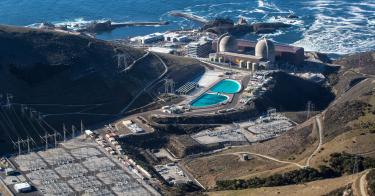President Biden recently signed into law the bipartisan Prohibiting Russian Uranium Imports Act, which properly sanctions Russia for invading Ukraine. But the United States should do more to end American dependency on Russian uranium.
The U.S. gets about 19% of its electricity from 93 commercial nuclear power reactors, which are powered by uranium.
But uranium is not useful as fuel until it is “enriched.” Enrichment is where our dependence on Russia becomes problematic.
Although uranium is an abundant mineral worldwide, the ability to enrich it for use in nuclear power plants is far more limited. Russia controls around 46% of global enrichment capacity, while the U.S. controls only 9.5%.
But America is the largest consumer of fuel-grade uranium, known as low-enriched uranium, or LEU. That means the United States can produce only around 20% of its LEU requirements domestically. The remaining requirements come from enrichment facilities in the United Kingdom, Germany and the Netherlands. Around 25% comes from Russia.
>>> Time To Bring Nuclear Energy Into the 21st Century
America was largely self-sufficient in uranium and LEU production until the end of the Cold War, when capacity in both began to decline. America went from nuclear fuel self-sufficiency to extreme dependency in a relatively short time—and too much of that dependency was on Russia.
No one cared much about this dependence until the spring of 2022, when it became clear that Russia had invaded Ukraine and America’s reliance on Russian uranium became a real problem. Not only was American dependent on Russia for uranium and related nuclear fuel services, but roughly $1 billion was flowing to Russian state-owned enterprises annually as a result.
Promptly after the invasion, Mr. Biden stopped oil imports from Russia. Now, Washington has acted to ban uranium imports. The legislation has three key parts. It bans the import of LEU from Russia or any Russian entity, prevents black market imports by banning LEU that “is determined to have been exchanged with, swapped for, or otherwise obtained” to circumvent the ban, and lasts until 2040.
A long-term ban is critical because expanding enrichment is time-consuming and expensive. Investors won’t expand capacity to make up for Russian supply if the ban may be terminated or waived, making low-cost Russian LEU available again to U.S. buyers.
While growing demand for non-Russian uranium fuel had already prompted America’s sole domestically located commercial enricher to expand capacity, a long-term ban on Russian imports is necessary to provide the market certainty required to justify investment in a broader expansion in the sector.
There are two potential stumbling blocks to expanding U.S. nuclear fuel capacity. The first is abuse of the waiver process that the Prohibiting Russian Uranium Imports Act establishes to allow some Russian imports through 2027 under certain conditions. While a waiver process may be necessary in specific cases, waivers must not be granted unless there is no alternate source for the LEU.
>>> EPA’s New Power Plant Rule Will Cause Catastrophic Energy Scarcity
Second, if domestic nuclear fuel production capabilities are to expand as expeditiously as possible, the government needs to get out of the way. The regulatory process for expanding, building and operating new domestic LEU capacity should be streamlined.
The private sector has been safely building and operating commercial enrichment facilities worldwide for decades, and it should be allowed to expand U.S. capacity with as little friction from Washington as possible.
Further, domestic uranium mining has almost disappeared. Opening new U.S. mines is extremely difficult, and a robust domestic mining industry helps to protect against foreign supply disruptions. Current policies mean domestic uranium miners miss out on the opportunity to provide secure supplies of uranium to American reactors, and American reactor operators must continue their dependence on foreign suppliers.
The time has come to move away from our dependence on Russian uranium, and the Prohibiting Russian Uranium Imports Act sets the stage. It’s time for Washington to build on this momentum and free America’s uranium fuel industry to once again lead the world into a clean, abundant and safe nuclear future.
This piece originally appeared in The Washington Times




